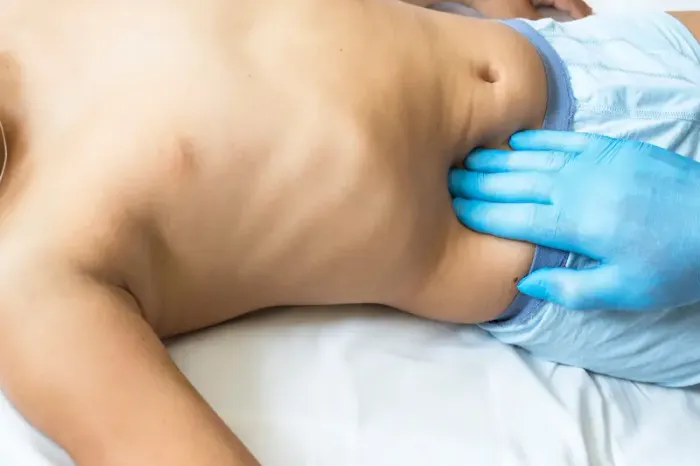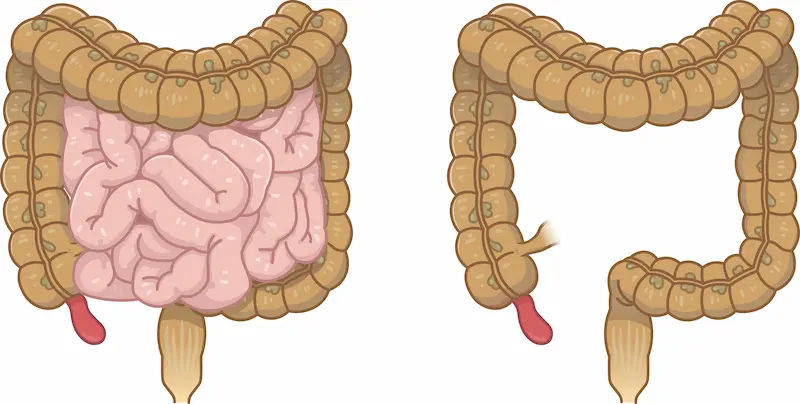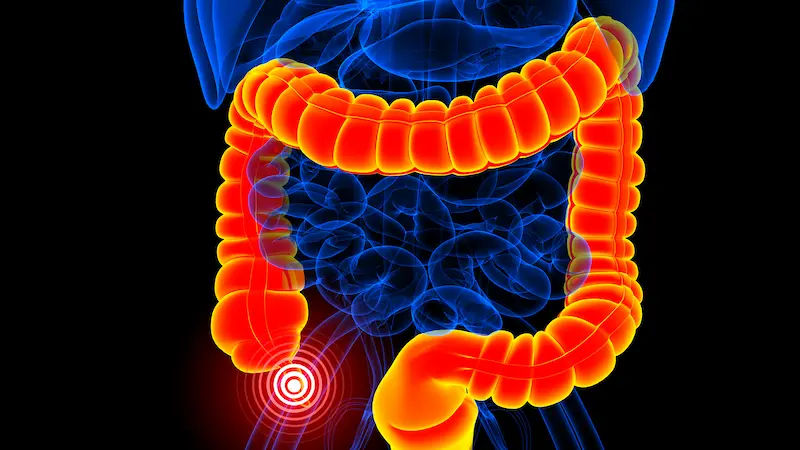Appendicitis Overview Symptoms, Causes, and Treatment
Know about appendicitis, what it is, symptoms, causes, diagnosis and treatment options for it. Learn about the prevention and care after the surgery.

Written by Dr. Mohammed Kamran
Reviewed by Dr. Shaik Abdul Kalam MD (Physician)
Last updated on 29th Aug, 2025

Introduction
Appendicitis is a common yet serious condition that requires prompt medical attention. If left untreated, it can lead to severe complications. This article will help you understand what appendicitis is, its symptoms, causes, and treatment options in simple terms.
What is Appendicitis?
Appendicitis is the inflammation (swelling) of the appendix, a small, finger-shaped pouch attached to the large intestine. While the exact function of the appendix is not entirely clear, when it gets blocked or infected, it can become inflamed, leading to pain and potential rupture if not treated quickly.
Consult a Gastrointestinal Specialist for Personalised Advice
Symptoms of Appendicitis
Recognising the symptoms early can help prevent complications. Common signs include:
1. Abdominal Pain – The most noticeable symptom, usually starting near the belly button and shifting to the lower right side. The pain worsens over time and may become sharp.
2. Loss of Appetite – A sudden lack of interest in eating.
3. Nausea and Vomiting – Often follows the onset of pain.
4. Fever – A mild fever may develop as the condition worsens.
5. Bloating and Gas – Discomfort and swelling in the abdomen.
6. Painful Urination or Bowel Movements – Some people experience discomfort while passing urine or stool.
Note: If you or someone you know has severe, worsening pain in the lower right abdomen, seek medical help immediately.
What Causes Appendicitis?
Appendicitis usually occurs when the appendix gets blocked. Possible causes include:
• Bacterial or Viral Infections – Infections can cause swelling in the appendix.
• Hardened Stool (Fecaliths) – A small, hard piece of stool can block the opening.
• Enlarged Lymph Nodes – Due to infections elsewhere in the body.
• Parasites or Tumours – Rarely, these can also cause blockages.
When the appendix is blocked, bacteria multiply inside, leading to infection, swelling, and pain. If not treated, the appendix can burst, spreading infection into the abdomen, a life-threatening condition called peritonitis.
How is Appendicitis Diagnosed?
Doctors use several methods to diagnose appendicitis:
1. Physical Examination – Pressing on the abdomen to check for pain.
2. Blood Tests – To check for infection (high white blood cell count).
3. Urine Test – To rule out urinary tract infections or kidney stones.
4. Imaging Tests – Ultrasound or CT scan to confirm swelling or blockage.
Get Your Health Assessed
If appendicitis is suspected, doctors may recommend immediate treatment to prevent complications.
Treatment Options for Appendicitis
The most common treatment is surgical removal of the appendix (appendectomy). There are two main types:
1. Laparoscopic Surgery – A minimally invasive procedure with small incisions and faster recovery.
2. Open Surgery – Used in severe cases (like a burst appendix), requiring a larger incision.
In some mild cases, doctors may prescribe antibiotics first to reduce infection before surgery. However, surgery is often necessary to prevent recurrence.
Recovery After Appendectomy
Recovery time depends on the type of surgery:
• Laparoscopic Surgery – Most people recover within 1-2 weeks.
• Open Surgery – May take 2-4 weeks for full recovery.
Post-Surgery Care Tips
• Avoid heavy lifting for a few weeks.
• Follow a light diet (soft foods initially).
• Take prescribed painkillers and antibiotics.
• Keep the incision clean and dry.
Can Appendicitis Be Prevented?
There’s no guaranteed way to prevent appendicitis, but some healthy habits may help reduce the risk:
• High-Fibre Diet – Eating fruits, vegetables, and whole grains may prevent blockages.
• Staying Hydrated – Drinking enough water helps digestion.
• Prompt Treatment of Infections – Addressing infections early may reduce complications.
When to See a Doctor?
Seek emergency medical care if you experience:
• Severe, worsening abdominal pain
• High fever with vomiting
• Inability to pass gas or stool
Early treatment can prevent serious complications like a ruptured appendix.
Final Thoughts
Appendicitis is a painful but treatable condition. Knowing the symptoms and acting fast can save lives. If you or a loved one experiences severe abdominal pain, don’t wait; seek medical help right away.
Consult a Gastrointestinal Specialist for Personalised Advice
Consult a Gastrointestinal Specialist for Personalised Advice

Dr Bhargav Vuppumalla
General Physician/ Internal Medicine Specialist
5 Years • MBBS MD GENERAL MEDICINE
Bengaluru
Apollo Medical Center, Marathahalli, Bengaluru

Dr Harish K C
Gastroenterology/gi Medicine Specialist
15 Years • MBBS MD DM MRCP(UK) (SCE-Gastroenterology and Hepatology)
Bangalore
Manipal Hospital, Bangalore

Dr. Shivaraj Afzalpurkar
Gastroenterology/gi Medicine Specialist
13 Years • MBBS, MD General medicine (Gold medalist), DrNB (Gastroenterology), MNAMS
Bengaluru
Apollo Clinic, JP nagar, Bengaluru

Dr. Paramesh K N
Gastroenterology/gi Medicine Specialist
16 Years • MBBS, MS ( General Surgery), DNB ( Surgical Gastroenterology)
Hyderabad
Sprint Diagnostics Centre, Hyderabad

Dr. Amit Pandita
Gastroenterology/gi Medicine Specialist
10 Years • MBBS. MD (INTERNAL MEDICINE) DrNB (GASTROENTEROLOGY AND HEPATOLOGY)
Delhi
Apollo Hospitals Indraprastha, Delhi
Consult a Gastrointestinal Specialist for Personalised Advice

Dr Bhargav Vuppumalla
General Physician/ Internal Medicine Specialist
5 Years • MBBS MD GENERAL MEDICINE
Bengaluru
Apollo Medical Center, Marathahalli, Bengaluru

Dr Harish K C
Gastroenterology/gi Medicine Specialist
15 Years • MBBS MD DM MRCP(UK) (SCE-Gastroenterology and Hepatology)
Bangalore
Manipal Hospital, Bangalore

Dr. Shivaraj Afzalpurkar
Gastroenterology/gi Medicine Specialist
13 Years • MBBS, MD General medicine (Gold medalist), DrNB (Gastroenterology), MNAMS
Bengaluru
Apollo Clinic, JP nagar, Bengaluru

Dr. Paramesh K N
Gastroenterology/gi Medicine Specialist
16 Years • MBBS, MS ( General Surgery), DNB ( Surgical Gastroenterology)
Hyderabad
Sprint Diagnostics Centre, Hyderabad

Dr. Amit Pandita
Gastroenterology/gi Medicine Specialist
10 Years • MBBS. MD (INTERNAL MEDICINE) DrNB (GASTROENTEROLOGY AND HEPATOLOGY)
Delhi
Apollo Hospitals Indraprastha, Delhi





.webp)